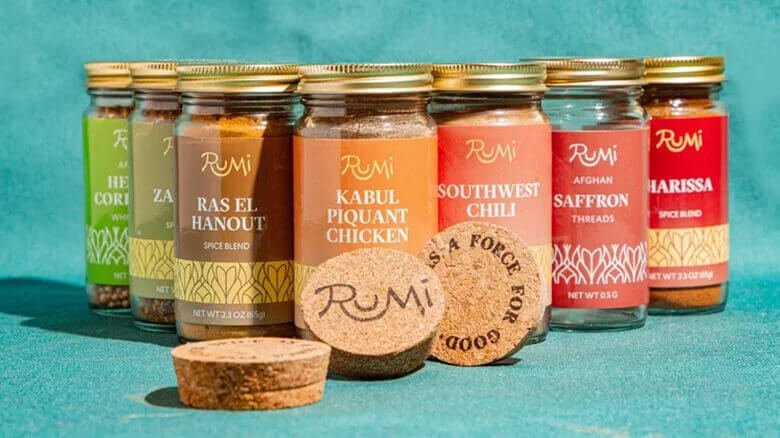Let’s get one thing straight about Shark Tank: A deal on screen doesn’t mean cash is wired the next day. Some founders walk in for a quick viral clip. Others, like the Rumi Spice crew, have a bigger game in mind—real impact, global supply chain, and a product most Americans can’t pronounce correctly.
Forget the bootstrapped sob story or another gadget chasing the Scrub Daddy high. This is Rumi Spice: a startup with serious hustle, military grit, and a mission that runs harder than most pitch-room fairy tales.
Who’s Behind Rumi Spice—and Why You Should Care
You know you’re not dealing with the average e-comm founder when the resumes read Afghanistan combat vet, not mompreneur. Rumi Spice was started by Emily Miller, Kim Jung, and Keith Alaniz—all friends, and all ex-military. They saw firsthand in Afghanistan how cash crops like saffron could flip a family’s decade—and sometimes their fate.
They didn’t come to pitch just a fancy jar of spices. This was about breaking cycles, building jobs for Afghan women, and plugging a war-torn nation straight into grocery stores across America. Skip the cynicism: everyone says they’re mission-driven, but this team actually chased impact where it hurts.

Shark Tank Pitch: The Ask, the Offer, the Guts
Fast-forward to Season 8, Episode 23 of Shark Tank. The founders step in asking for $250,000 for 5% equity. That’s a big ask. Is the valuation cheeky? Sure. But remember: you’re selling the story, the growth, and the founder fire. Rumi’s numbers made Sharks pause—$8.30 landed cost for the saffron jar, selling for $35 retail, $400K revenue clocked, aiming for $750K by year-end.
They went heavy on the mission: This isn’t just a ‘get-rich’ play—we connect Afghan farmers and women to global markets. Respect. But let’s be honest, this isn’t a feel-good charity donation—it’s a test of whether mission plus margins equals a real business.
Shark Reactions: Who Bit, Who Bolted?
Pitch rooms get real quiet when the numbers and taste tests don’t match. Daymond John—he’s the streetwise dream killer—tapped out, saying the price point was just too high for average shoppers. Lori Greiner passed after a flavor test—it didn’t hit her palate. O’Leary? He got stuck on the forecasts and revenue, saying the story was better than the numbers.
Robert Herjavec toyed with jumping in, but when Mark Cuban entered the room, the wind changed. Cuban respected the mission and the team’s experience. His take? He offered $250K, but for 15% equity—not the 5% the founders wanted. Here’s the trick: Cuban’s offer was a lesson in reality. You want Shark cash? You pay Shark price. I’ve seen founders get stubborn and leave with nothing—Rumi played the game, taking Mark’s terms. On air, it looked like a handshake was done.
Net Worth and Funding Rounds: Where’s Rumi Spice Now?
Let’s cut through the Shark Tank afterglow. You see a deal on TV; you think the money lands. Not so fast. Mark Cuban’s deal with Rumi Spice? Never actually closed. The founders and Cuban couldn’t get it over the line after the cameras shut off—so don’t go counting Mark as an investor on their cap table.
But here’s where real founders separate themselves: post-Tank, Rumi Spice pulled $2.5 million in venture capital from InFrontier. That’s bigger than any one Shark, especially if you want to scale fast and wide. The exposure from Shark Tank was the real value—investors suddenly saw a cool, globally relevant brand, and smart money started knocking.
The company’s net worth? No published numbers, but with millions in funding and Whole Foods on their side, it’s safe to call them a multi-million-dollar operation.

Was the Mark Cuban Deal a Sign of Success or Flop?
Open secret in the startup game: A yes on TV means nothing until the wires hit. Rumi Spice shook Cuban’s hand but never made it work in due diligence. Maybe the equity ask, maybe supply issues in Afghanistan, maybe the numbers just got cold under an accountant’s lens.
Would Cuban’s brand rocket-boosted them? Maybe. But Rumi Spice leveraged that Shark Tank platform, owned their narrative, and proved you can win big even if the billionaire never actually writes his check.
How Rumi Spice Grew After the TV Cameras
You see a lot of brands stumble after the big TV moment. The rush dies down, orders fade, and the mission gets lost. Here’s where Rumi Spice flipped the script—they didn’t rest on mission or hype.
Instead, they used that TV moment as a lever. They expanded the line: mulling spice, Afghan curry, paella blend, saffron teas, Afghani cumin, even saffron-based jam. That’s how you go from one-skew startup to a shelf presence that can pitch national buyers.
The result? National rollout with Whole Foods. That’s the badge every food founder wants—and requires more than a 7-minute Shark Tank edit. It means you’ve dialed in sourcing, logistics, and brand storytelling. They pulled a play straight out of the Bombas DTC handbook—high-margin hero product, but plenty of LTV left in the catalog.
Team Transition: Real Succession, Not Founder Ego
Here’s something you don’t see enough: founders knowing when to step back. Emily Miller, Kim Jung, and Keith Alaniz built the foundation but brought in a pro CEO to scale Rumi Spice. It’s not about ego; it’s about bandwidth.
Running a supply chain across conflict zones, expansion into grocery, and managing multi-million dollar funding? That’s when you need a different playbook and someone who’s not tangled in the founder-headspace. For hustlers reading this, take note: sometimes the big move is stepping aside so the company gets what it needs—not just what you want.
Where Rumi Spice Stands Now: Retail, Product Line, and Impact
Right now, in 2025, Rumi Spice is still grinding. They’ve got more than just saffron on the shelf. It’s a real spice company, not just a one-hit-wonder. Their products cover multiple cuisines, and you’ll find them at Whole Foods and on their site.
But the most important part? They’re still sourcing directly from Afghan farmers, especially women. They aren’t watering down the mission to chase a bigger profit margin. That’s rare air in the packaged food game—most brands drop the impact to chase volume as they scale.
What Entrepreneurial Hustlers Can Actually Learn Here
Rumi Spice didn’t win because they landed a Shark’s cash—they won because they understood what comes after the pitch. They played the long game: big mission, tight numbers, and grabbing exposure. When the Shark deal fell through, they didn’t whine. They hunted bigger VC, scaled the line, and grabbed national doors.
Most people walk in with a product. Rumi Spice walked in with a story, a mission, and proof that values pay off if you hustle right. Stepping back as founders? That’s not weakness—that’s knowing timing, team, and impact. And the Hollywood handshake? Sometimes it means less than a real, working supply chain or a $2.5M venture round. Remember that next time you’re chasing the flashy thing instead of the solid thing.
Still think you need a Shark to win this thing? The Rumi team says otherwise.
FAQs Entrepreneurs Actually Want Answered
1. Is Rumi Spice Still in Business After Shark Tank?
Yes, they’re not just surviving—they’re scaling. You’ll find them in Whole Foods and all over the web.
2. Did Mark Cuban Invest in Rumi Spice?
No. Cuban made an on-air deal, but it was never finalized after the cameras. They did it without him.
3. What Is Rumi Spice’s Net Worth or Valuation Now?
No public number, but with $2.5 million in VC and national retail, they’re definitely in multi-million territory.
4. Where Can You Buy Rumi Spice Products Today?
Whole Foods, online through their own site, Amazon, and specialty stores across the U.S.
5. Do the Original Founders Still Run Rumi Spice?
No. They hired a professional CEO as the company scaled.
6. What Makes Rumi Spice Different from Other Spice Companies?
Direct sourcing from Afghanistan, supporting women farmers, and a legit social mission baked into the business.
7. Did Shark Tank Help Rumi Spice Grow Their Retail Presence?
Yes. The exposure opened doors to VC, retail, and media the founders wouldn’t have gotten cold-pitching.
8. Does Rumi Spice Still Support Afghan Farmers, Especially Women?
Absolutely. That’s still the heart of their operation, even as they scale up product lines.
This story isn’t about Shark Tank magic. It’s about what savvy founders do with 7 minutes in the spotlight and how to sell a mission built on more than a margin. If you’re chasing the next big pitch or the next investor, take a page out of the Rumi Spice playbook—then go make your own.
This deep-dive brought to you by SharkWorth—where we call out the stories that count.










